- Home
- Clive Barker
The Reconciliation Page 4
The Reconciliation Read online
Page 4
As he came within half a dozen strides of the room somebody moved across the doorway, flitting through his field of vision too quickly to be seen. He flattened himself against the wall and edged towards the room. A wick, set in a bowl of oil on a table, shed the light he'd been drawn to. Beside it, several plates contained the remains of a meal. When he reached the door he waited there for the man—the night watch, he supposed—to come back into view. He had no wish to kill him unless it was strictly necessary. There'd be enough widows and orphans in Yzordderrex by tomorrow morning without his adding to the sum. He heard the man fart, not once but several times, with the abandon of someone who believed himself alone, then heard him open another door, his footsteps receding.
Gentle chanced a glance around the doorjamb. The room was empty. He quickly stepped inside, intending to take from the table the two knives that were lying there. On one of the plates was an already rifled assortment of candies. He couldn't resist.
He picked the most luscious and had it to his mouth when the man behind said, “Rosengarten?”
He looked around, and as his gaze settled on the face across the room his jaw clenched in shock, breaking on the candy between his teeth. Sight and sugar mingled, tongue and eye feeding such a sweetness to his brain he reeled.
The face before him was a living mirror: his eyes, his nose, his mouth, his hairline, his bearing, his bafflement, his fatigue. In everything but the cut of his coat and the muck beneath his fingernails, another Gentle. But not by that name, surely.
Swallowing the sweet liqueur from the candy, Gentle very slowly said, “Who ... in God's name ... are you?”
The shock was draining from the other's face, and amusement replacing it. He shook his head. ”. . . damn kreauchee ...”
“That's your name?” Gentle replied. “Damn Kreauchee?”
He'd heard stranger in his travels. But the question only served to amuse the other more.
“Not a bad idea,” he replied. “There's enough in my system. The Autarch Damn Kreauchee. That's got a ring to it.”
Gentle spat the candy from his mouth. “Autarch?” he said.
The amusement fled from the other's face. “You've made your point, wisp. Now fuck off.” He closed his eyes. “Get a hold of yourself,” he half whispered. “It's the fucking kreauchee. It's happened before, it'll happen again.”
Now Gentle understood. “You think you're dreaming me, don't you?” he said.
The Autarch opened his eyes, angered to find the hallucination still hanging around. “I told you—” he said.
“What is this kreauchee? Some kind of alcohol? Dope? Do you think I'm a bad trip? Well, I'm not.”
He started towards the other, who retreated in alarm.
“Go on,” Gentle said, extending his hand. “Touch me. I'm real. I'm here. My name's John Zacharias, and I've come a long way to see you. I didn't think that was the reason, but now I'm here, I'm sure it was.”
The Autarch raised his fists to his temples, as if to beat this drug dream from his brain.
“This isn't possible,” he said. There was more than disbelief in his voice; there was an unease that was close to fear. “You can't be here. Not after all these years.”
“Well, I am,” said Gentle. “I'm as confused as you, believe me. But I'm here.”
The Autarch studied him, turning his head this way and that, as though he still expected to find some angle from which to view the visitor that would reveal him as an apparition. But after a minute of such study he gave it up and simply stared at Gentle, his face a maze of furrows.
“Where did you come from?” he said slowly.
“I think you know,” Gentle replied.
“The Fifth?”
“Yes.”
“You came to bring me down, didn't you? Why didn't I see it? You started this revolution! You were out in the streets, sowing the seeds! No wonder I couldn't root the rebels out. I kept wondering: Who is it? Who's out there, plotting against me? Execution after execution, purge after purge, and I never got to the one at the heart of it. The one who was as clever as me. The nights I lay awake thinking: Who is it? Who? I made a list as long as my arm. But never you, Maestro. Never Sartori.”
Hearing the Autarch name himself was shocking enough, but this second naming bred utter rebellion in Gentle's system. His head filled with the same din that had beset him on the platform at Maike, and his belly disgorged its contents in one bilious heave. He put his hand out to the table to steady himself and missed the edge, slipping to the floor where his vomit was already spattered. Floundering in his own mess, he tried to shake the noise from his head, but all he did was unknot the confusion of sounds and let the words they concealed slip through.
Sartori! He was Sartori! He didn't waste breath questioning the name. It was his, and he knew it. And what worlds there were in that naming: more confounding than anything the Dominions had unveiled, opening before him like windows blown wide and shattered, never to be closed again.
He heard the name spoken out of a hundred memories. A woman sighed it as she begged him back into her disheveled bed. A priest beat out the syllables on his pulpit, prophesying damnation. A gambler blew it into his cupped hands to bless his dice. Condemned men made prayers of it; drunkards, mockery; carousers, songs.
Oh, but he'd been famous! At St. Bartholomew Fair there'd been troupes who'd filled their purses, telling his life as farce. A bordello in Bloomsbury had boasted a sometime nun driven to nymphomania by his touch, who would chant his conjurations (so she said) as she was fucked. He was a paradigm of all things fabulous and forbidden: a threat to reasoning men; to their wives, a secret vice. And to the children—the children, trailing past his house after the beadle—he was a rhyme:
Maestro Sartori
Wants a bit o'glory.
He loves the cats,
He loves the dogs,
He turns the ladies into frogs,
He made some hats
Of baby rats;
But that's another story.
This chant, repeated in his head in the piping voices of parish orphans, was worse in its way than the pulpit curses, or the sobs, or the prayers. It rolled on and on, in its fatuous way, gathering neither meaning nor music as it went. Like his life, without this name: motion without purpose.
“Had you forgotten?” the Autarch asked him.
“Oh, yes,” Gentle replied, unbidden and bitter laughter coming to his lips with the reply. “I'd forgotten.”
Even now, with the voices rebaptizing him with their clamor, he could scarcely believe it. Had this body of his survived two hundred years and more in the Fifth Dominion, while his mind went on deceiving itself: holding only a decade of life in its consciousness and hiding the rest away? Where had he lived all those years? Who had he been? If what he'd just heard was true, this act of remembering was just the first. There were two centuries of memories concealed in his brain somewhere, waiting to be discovered. No wonder Pie had kept him in ignorance. Now that he knew, madness was very close.
He got to his feet, holding on to the table for support. “Is Pie 'oh' pah here?” he said.
“The mystif? No. Why? Did it come with you from the Fifth?”
“Yes, it did.”
A twitch of a smile returned to the Autarch's face. “Aren't they exquisite creatures?” he said. “I've had one or two myself. They're an acquired taste, but once you've got it you never really lose it again. But no, I haven't seen it.”
“Judith, then?”
“Ah.” He sighed. “Judith. I assume you mean Godolphin's lady? She went by a lot of names, didn't she? Mind you, we all did. What do they call you these days?”
“I told you. John Furie Zacharias. Or Gentle.”
“I have a few friends who know me as Sartori. I'd like to number you among them. Or do you want the name back?”
“Gentle will do. We were talking about Judith. I saw her this morning, down by the harbor.”
“Did you see Christ down there?”
“What are you talking about?”
“She came back here saying she'd seen the Man of Sorrows. She had the fear of the Lord in her. Crazy bitch.” He sighed. “It was sad, really, to see her that way. I thought it was just too much kreauchee at first, but no. She'd finally lost her mind. It was running out of her ears.”
“Who are we talking about?” Gentle said, thinking one or the other of them had mislaid the path of the conversation.
“I'm talking about Quaisoir, my wife. She came with me from the Fifth.”
“I was talking about Judith.”
“So was I.”
“Are you saying—”
“There are two. You made one of them yourself, for God's sake, or have you forgotten that too?”
“Yes. Yes, I'd forgotten.”
“She was beautiful, but she wasn't worth losing the Imajica for. That was your big mistake. You should have served your hand and not your rod. Then I'd never have been born, and God would be in His heaven, and you'd be Pope Sartori. Ha! Is that why you came back? To become pope? It's too late, brother. By tomorrow morning Yzordderrex will be a heap of smoking ash. This is my last night here. I'm going to the Fifth. I'm going to build a new empire there.”
“Why?”
“Don't you remember the rhyme they used to sing? For glory's sake.”
“Haven't you had enough of that?”
“You tell me. Whatever's in my heart was plucked from yours. Don't tell me you haven't dreamed of power. You were the greatest Maestro in Europe. There was nobody could touch you. That didn't all evaporate overnight.”
He moved towards Gentle for the first time in this exchange, reaching out to lay his steady hand on Gentle's shoulder.
“I think you should see the Pivot, brother Gentle,” he said. “That'll remind you of what power feels like. Are you steady on your feet?” “Reasonably.” “Come on, then.”
He led the way back into the passage, to the flight of stairs Gentle had declined to take. Now he did so, following Sartori around the curve of the staircase to a door without a handle.
“The only eyes laid on the Pivot since the tower was built are mine,” he said. “Which has made it very sensitive to scrutiny.”
“My eyes are yours,'1 Gentle reminded him. “It'll know the difference,” Sartori replied. “It'll want to . . . probe you.” The sexual subtext of this wasn't lost on him. “You'll just have to He back and think of England,” he said. “It's over quickly.”
So saying he licked his thumb and laid it on the rectangle of slate-colored stone set in the middle of the door, inscribing a figure in spittle upon it. The door responded to the signal. Its locks began to grind into motion.
“Spit too, huh?” Gentle said. “I thought it was just breath.”
“You use pneuma?” Sartori said. “Then I should be able to. But I haven't got the trick of it. You'll have to teach me, and I'll... remind you of a few sways in return.” “I don't understand the mechanics of it.” “Then we'll learn together,” Sartori replied. “The principles are simple enough. Matter and mind, mind and matter. Each transforming the other. Maybe that's what we're going to do. Transform one another.”
With that thought, Sartori put his palm on the door and pushed it open. Though it was fully six inches thick it moved without a sound, and with an extended hand Sartori invited Gentle to enter, speaking as he did so.
“It's said that Hapexamendios set the Pivot in the middle of the Imajica so that His fertility would flow from it into every Dominion.” He lowered his voice, as if for an indiscretion. “In other words,” he said. “This is the phallus of the Unbeheld.”
Gentle had seen this tower from the outside, of course; it soared above every other pylon and dome in the palace. But he hadn't grasped its enormity until now. It was a square stone tower, seventy or eighty feet from side to side and so tall that the lights blazing in the walls to illuminate its sole occupant receded like cat's eyes in a highway till sheer distance dimmed then erased them. An extraordinary sight: but nothing beside the monolith around which the tower had been constructed. Gentle had been steeling himself for an assault when the door was opened: the tone he'd heard in his skull as he'd crept along the passage below rattling his teeth, the charge burning in his fingers. But there was nothing, not even a murmur, which was in its way more distressing. The Pivot knew he was here in its chamber but was keeping its counsel, silently assessing him as he assessed it.
There were several shocks. The first, and the least, how beautiful it was, its sides the color of thunderclouds, hewn so that seams of brightness flowed in them like hidden lightning. The second, that it was not set on the ground but hovered, in all its enormity, ten feet from the floor of the tower, casting a shadow so dense that the dark air was almost a plinth.
“Impressive, huh?” Sartori remarked, his cocky tone as inappropriate as laughter at an altar. “You can walk underneath it. Go on. It's quite safe.”
Gentle was reluctant, but he was all too aware that his other was watching for his weaknesses, and any sign of fear now might be used against him later. Sartori had already seen him sickened and down on his knees; he didn't want the bastard to get another glimpse of frailty.
“Aren't you coming with me?” he said, glancing around at the Autarch.
“It's a very private moment,” the other replied, and stood back to let Gentle venture into the shadow.
It was like stepping back into the wastes of the Jokalaylau. Cold cut him to the marrow. His breath was snatched from his lungs and appeared before him in a bitter cloud. Gasping, he turned his face to the power above him, his mind divided between the rational urge to study the phenomenon and the barely controllable desire to drop to his knees and beg it not to crush him. The heaven above him had five sides, he saw. One for each Dominion, perhaps. And like the hewn flanks, flickers of lightning appeared in it here and there. But it wasn't simply a trick of seam and shadow that gave the stone the look of a thundercloud. There was motion in it, the solid rock roiling above him. He threw a glance towards Sartori, who was standing at the door, casually putting a cigarette between his lips. The flame he struck to light it with was a world away, but Gentle didn't envy him its warmth. Icy as this shadow was, he wanted the stone sky to unfurl above him and deliver its judgment down; he wanted to see whatever power the Pivot possessed unleashed, if only to know that such powers and such judgments existed. He looked away from Sartori almost contemptuously, the thought shaping in his head that for all the other's talk of possessing this monolith, the years it had spent in this tower were moments in its incalculable span, and he and Sartori would have come and gone, their little mark eroded by those that followed, in the time it took the stone to blink its cloudy eye.
Perhaps it read that thought from his cortex and approved, because the light, when it came, was kind. There was sun in the stone as well as lightning, warmth as well as a killing fire. It brightened the mantle, then fell in shafts, first around him, then upon his upturned face. The moment had antecedents: events in the Fifth that had prophesied this, their parent's, coming. He'd stood on Highgate Hill once, when the city road was still a muddy track, and looked up to see the clouds drop glory down as they were doing now. He'd gone to the window of his room in Gamut Street and seen the same. He'd watched the smoke clear after a night of bombing—1941, the Blitz at its height—and seeing the sun burn through, had known in some place too tender to be touched that he'd forgotten something momentous, and that if he ever remembered—if a light like this ever burned the veil away—the world would unravel.
That conviction came again, but this time there was more than a vague unease to support it. The tone that had sounded in his skull had come again, attendant on the light, and in it, described by the subtlest variation in its monotony, he heard words.
The Pivot was addressing him.
Reconciler, it said.
He wanted to cover his ears and shut the word out. Drop to the ground like a prophet begging to be unburdened o
f some divine duty. But the word was inside as well as out. There was no escaping it.
The work's not finished yet, the Pivot said.
“What work?” he said.
You know what work.
He did, of course. But so much pain had come with that labor, and he was ill equipped to bear it again.
Why deny it? the Pivot said.
He stared up into the brightness. “I failed before, and so many people died. I can't do it again. Please. I can't.”
What did you come here for? the Pivot asked him, its voice so tenuous he had to hold his breath to catch the shape of the words. The question took him back to Taylor's bedside, to that plea for comprehension.
“To understand ...” he said.
To understand what?
“I can't put it into words ... it sounds so pitiful....”
Say it.
“To understand why I was born. Why anybody's born.”
You know why you were born.
“No, I don't. I wish I did, but I don't.”
You're the Reconciler of Dominions. You 're the healer of the Imajica. Hide from that, and you hide from understanding. Maestro, there's a worse anguish than remembering, and another suffers it because you leave your work unfinished.

 The Great and Secret Show
The Great and Secret Show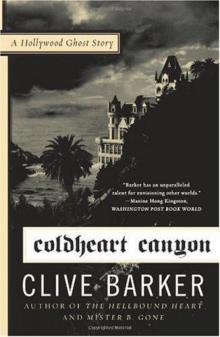 Coldheart Canyon: A Hollywood Ghost Story
Coldheart Canyon: A Hollywood Ghost Story Galilee
Galilee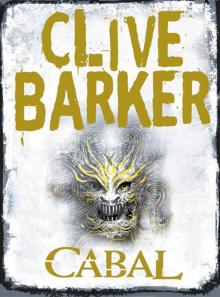 Cabal
Cabal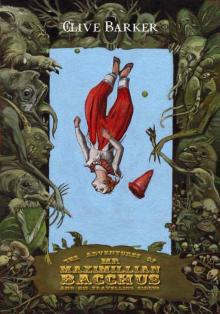 The Adventures of Mr. Maximillian Bacchus and His Travelling Circus
The Adventures of Mr. Maximillian Bacchus and His Travelling Circus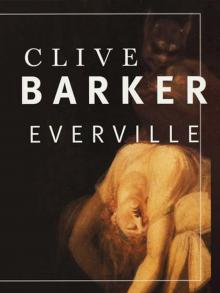 Everville
Everville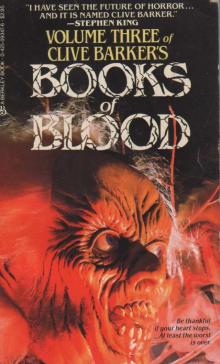 Books of Blood: Volume Three
Books of Blood: Volume Three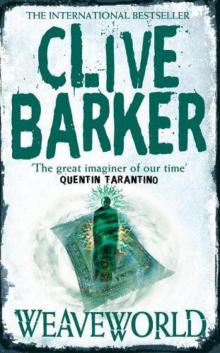 Weaveworld
Weaveworld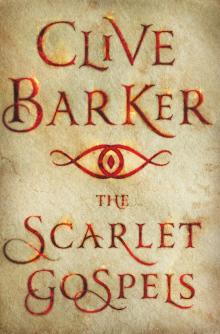 The Scarlet Gospels
The Scarlet Gospels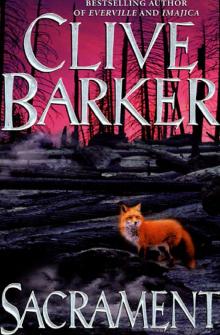 Sacrament
Sacrament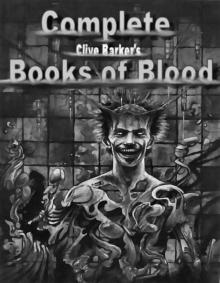 Books of Blood: Volumes 1-6
Books of Blood: Volumes 1-6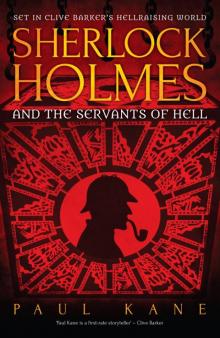 Sherlock Holmes and the Servants of Hell
Sherlock Holmes and the Servants of Hell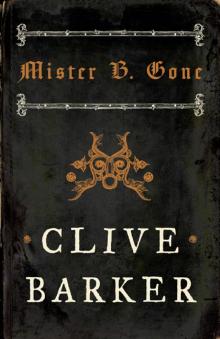 Mister B. Gone
Mister B. Gone Imajica
Imajica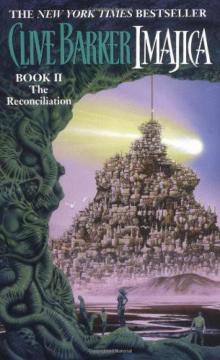 The Reconciliation
The Reconciliation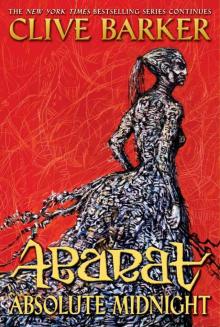 Abarat
Abarat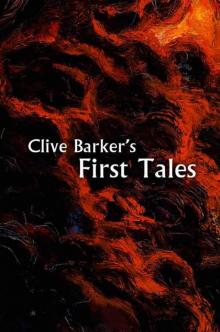 Clive Barker's First Tales
Clive Barker's First Tales The Hellbound Heart
The Hellbound Heart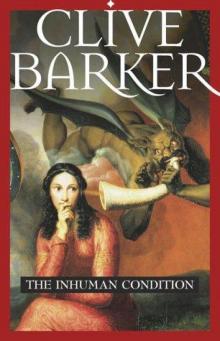 The Inhuman Condition
The Inhuman Condition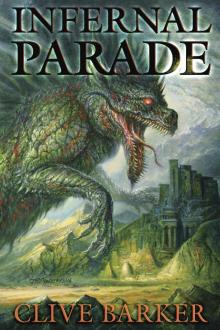 Infernal Parade
Infernal Parade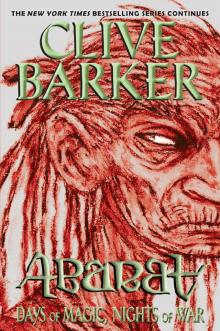 Days of Magic, Nights of War
Days of Magic, Nights of War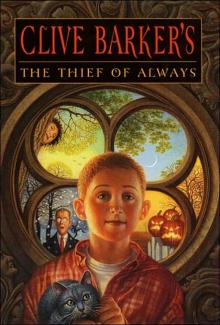 The Thief of Always
The Thief of Always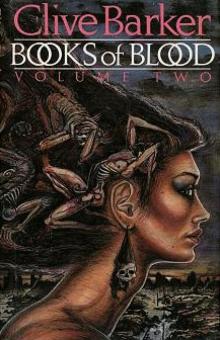 Books of Blood Vol 2
Books of Blood Vol 2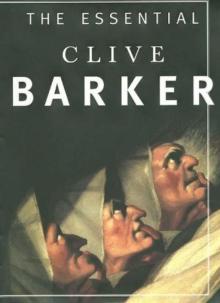 The Essential Clive Barker
The Essential Clive Barker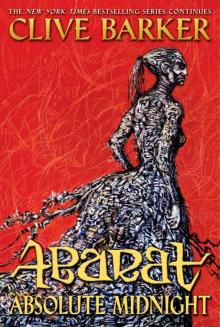 Abarat: Absolute Midnight a-3
Abarat: Absolute Midnight a-3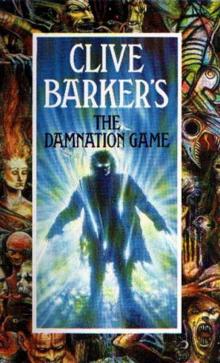 The Damnation Game
The Damnation Game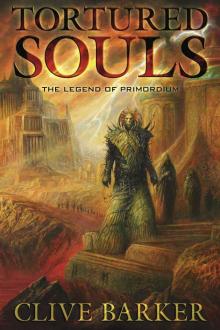 Tortured Souls: The Legend of Primordium
Tortured Souls: The Legend of Primordium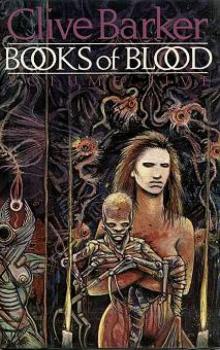 Books of Blood Vol 5
Books of Blood Vol 5 Imajica 02 - The Reconciliator
Imajica 02 - The Reconciliator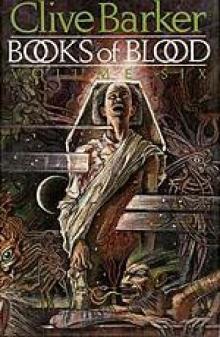 Books Of Blood Vol 6
Books Of Blood Vol 6 Imajica 01 - The Fifth Dominion
Imajica 01 - The Fifth Dominion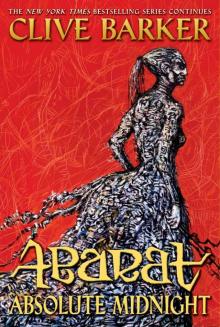 Abarat: Absolute Midnight
Abarat: Absolute Midnight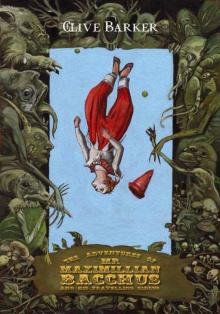 The Adventures of Mr. Maximillian Bacchus & His Traveling Circus
The Adventures of Mr. Maximillian Bacchus & His Traveling Circus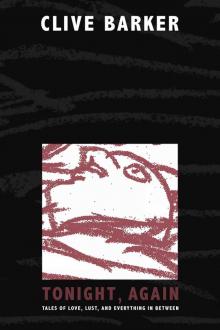 Tonight, Again
Tonight, Again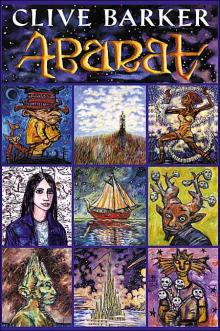 Abarat: The First Book of Hours a-1
Abarat: The First Book of Hours a-1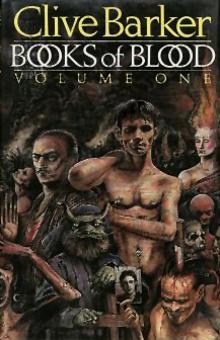 Books Of Blood Vol 1
Books Of Blood Vol 1 Age of Desire
Age of Desire Imajica: Annotated Edition
Imajica: Annotated Edition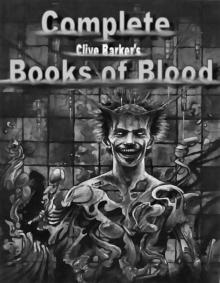 Complete Books of Blood
Complete Books of Blood Gutted: Beautiful Horror Stories
Gutted: Beautiful Horror Stories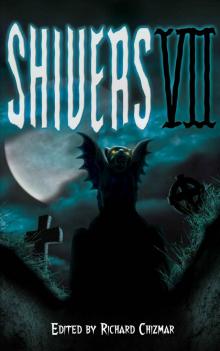 Shivers 7
Shivers 7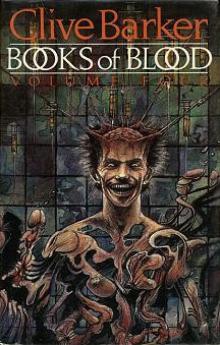 Books Of Blood Vol 4
Books Of Blood Vol 4